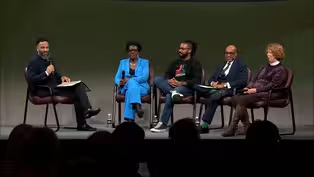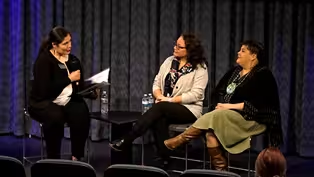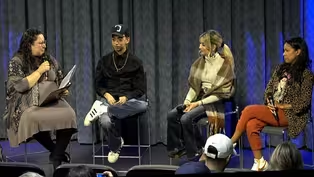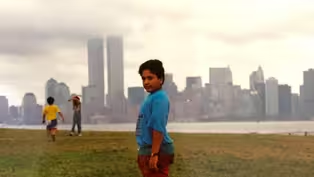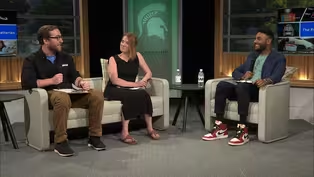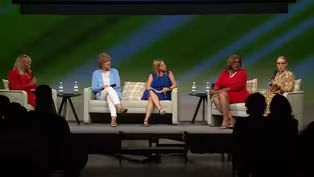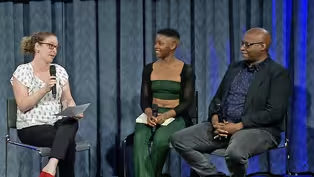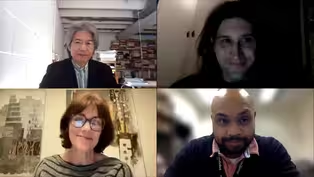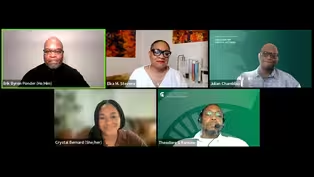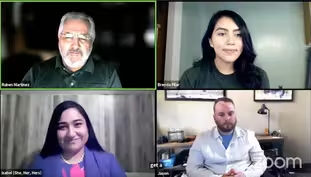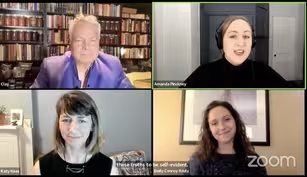
Panel Q & A - Storming Caesars Palace
Special | 25m 19sVideo has Closed Captions
Panel discussion following the film Storming Caesars Palace
Panel discussion following the film Storming Caesars Palace, from Independent Lens. With panelists Dr. LeConté J. Dill, Department of African American and African Studies at MSU; Dr. Temple Smith, Michigan Public Health Institute; Dana Watson, Ingham County Health Department. The moderator is Dr. Yvonne Morris, Department of African American and African Studies at MSU. Recorded 3/23/23
Problems playing video? | Closed Captioning Feedback
Problems playing video? | Closed Captioning Feedback
WKAR Specials is a local public television program presented by WKAR
Presented as part of WKAR's Century of Service celebration.
Supported in part by
MSU Federal Credit Union
Consumers Energy

Panel Q & A - Storming Caesars Palace
Special | 25m 19sVideo has Closed Captions
Panel discussion following the film Storming Caesars Palace, from Independent Lens. With panelists Dr. LeConté J. Dill, Department of African American and African Studies at MSU; Dr. Temple Smith, Michigan Public Health Institute; Dana Watson, Ingham County Health Department. The moderator is Dr. Yvonne Morris, Department of African American and African Studies at MSU. Recorded 3/23/23
Problems playing video? | Closed Captioning Feedback
How to Watch WKAR Specials
WKAR Specials is available to stream on pbs.org and the free PBS App, available on iPhone, Apple TV, Android TV, Android smartphones, Amazon Fire TV, Amazon Fire Tablet, Roku, Samsung Smart TV, and Vizio.
More from This Collection
Panel discussions following WKAR film screenings. Featuring filmmakers, policy makers, community partners and more.
Panel Q & A - The Cost of Inheritance
Video has Closed Captions
Panel discussion following the film The Cost of Inheritance. (30m 59s)
Video has Closed Captions
Panel discussion following the film Warrior Lawyers. (33m 42s)
Panel Q & A – First Voice Generation
Video has Closed Captions
Panel discussion following the film First Voice Generation. (31m 2s)
Video has Closed Captions
Panel following the film "American Jedi." Discussion features the film’s producers. (48m 46s)
Panel Q & A – NOVA Science Studio Showcase
Video has Closed Captions
WKAR showcases highlights from the NOVA Science Studio project. (53m 35s)
Panel Q & A – Building the Reading Brain
Video has Closed Captions
Panel discussion following the WKAR original film, Building the Reading Brain. (36m)
Video has Closed Captions
Panel discussion following the film Afrofantastic. Featuring filmmaker Julian Chambliss (29m 6s)
Panel Q & A – Free Chol Soo Lee
Video has Closed Captions
Panel discussion following the film Free Chol Soo Lee. (29m 48s)
Video has Closed Captions
Panel discussion following the episode Afrofuturism, from the Artbound series (33m 56s)
Panel Q&A - Brenda's Story: From Undocumented to Documented
Video has Closed Captions
Panel discussion following the film Brenda's Story (25m 44s)
Panel Q & A - Benjamin Franklin
Video has Closed Captions
Panel discussion following the film Benjamin Franklin. (21m 46s)
Video has Closed Captions
Panel discussion following the film Unadopted. (31m 45s)
Providing Support for PBS.org
Learn Moreabout PBS online sponsorship- Hello, and welcome, everyone.
I am Dr. Yvonne Morris of the College of Arts and Letters at Michigan State University.
I'm so glad you can join us for the screening of the film, "Storming Caesars Palace."
It is part of the Independent Lens Pop-Up series of films presented tonight by WKAR.
We just viewed a shortened version of the film.
The full 90 minute documentary is streaming now at pbs.org and in the PBS video app.
For tonight's discussion, please enter any of your questions for our panelists into the comment box, and I will ask them to the panelists as time allows.
So now it is my pleasure to introduce our panel for tonight.
We have Dr. Temple Smith of Michigan Public Health Institute, Dana Watson of Ingham County Health Department, and Dr. LeConte Dill of the College of Arts and Letters at Michigan State University.
So we have questions prepared, but before we get into the questions, I would like for each of you to share a quick take on your reaction to the film, and I can start with Dana, and then we can go to LeConte and Temple.
- Thank you.
I love seeing the power of the people, so when people can get together and open people's eyes more or also create a fair nation, a fair state for themselves, that's beautiful and fantastic, and it goes to show it's not just about money that we have or our positions that we have, and so it was a great film to see, thank you.
- Similarly, I loved learning the names and background stories of the women as leaders.
Some of the women being, as Cardi says, regular degular women from their communities who are leaders, were leaders, leaders already in their families and communities, but became national leaders.
- Don't even know where to begin.
I think it's just a powerful tribute and collection of stories that just demonstrate not only the power of organizing around a cause, but also how relevant and recent some of these things are.
I think we tend to think that these things don't have contemporary context, but they do in really powerful ways, and these are some of the things I'm looking forward to discussing as we get into our discussion tonight, so I'm pretty excited to be a part of this panel, and to talk about it.
- Thank you all so much.
So before we get into the questions, I wanted to provide a little bit of context to Las Vegas, the locality, and the climate that it was in at that time.
So Ruby Duncan is a legend in Las Vegas, and so as we learned in a documentary.
- [Recording] Excited to be a part of this panel.
- Ruby Duncan arrived to Las Vegas in about the 1950s, so she was approaching her 20s, and then she became engaged in her political activist work in the 1970s-ish, so she was approaching 40 at that time.
So in the '50s, '60s, we had a large migration of Black individuals and families, particularly from the South, so we had our great migration north to the Midwest, but then also to the west of the United States as well.
And so one of the reasons, as mentioned in the documentary, was the availability of work, and then also we had an Air Force base that was just built in Las Vegas at that time, so we had work, and we had military that were draws to Las Vegas.
And so additionally as mentioned, Las Vegas was segregated at that time, so we had a railroad track that ran north and south, and everything west of the railroad track, that's where Black folks were allowed to live.
And so some parts of it were rural, as mentioned, the chicken coops, houses that look like chicken coops, although the Westside is very livestock friendly, but it was also thriving economically as well.
So Jackson Street was really popular, and as Claytee White mentioned, it was only a few blocks away from downtown Las Vegas, and so one of the draws to the Westside of Las Vegas was part of the entertainment industry on the strip where Black performers were not allowed to engage.
They could perform on a strip, but they, like Sammy Davis Jr. for example, performing with the Rat Pack, he wasn't able to enter through the main doors of the casino.
He had to go through the kitchens in order to get to the stage and perform.
So a lot of the performers, Sammy Davis Jr., Lena Horne, Dorothy Dandridge, after they would perform, they would go to the Westside and have additional performances there in the evening, so segregation was still very much prominent during this time in Las Vegas, to provide a little bit of context.
Claytee White, who was featured in the film, has done amazing work archiving the history of Black Las Vegas, and so you can feel free to check out her work as well to learn more about it.
So into the questions, I will start with Dana for our first one.
What makes the history of the welfare rights movement a civil rights story?
- I think it makes it a civil rights story 'cause thinking about civil rights, it makes me think about when systems of oppression are exposed, and the conversation and the movement is led by the people who are deeply impacted by that system of oppression.
We saw them gathering, and holding marches, and going into places where people would have to listen to them, and they could also use their power to pause what was going on so that people could see that they play a role in what was happening in this system was of oppression, and yeah, that's what I'll say for now.
- Thank you so much.
Did any of our other panelists wanna add any to the question?
Perfect, all right, so then my next question is for LeConte.
Would you describe the welfare rights movement as part of the womanist or feminist movement?
- Definitely, the welfare rights movement was not just part of the feminist movement, but it actually helped to flesh out and frame the feminist movement.
I'll try to describe that in three hopefully brief ways, 'cause we have a lot to discuss tonight.
So one way is that the women, being poor women, and we know, we heard in the film that welfare has existed for a long time, and the majority of recipients are white, but during this era of the 1960s, we have more Black women and more women of color signing up for welfare.
So because of their position as poor women, as women of color, they were actually able to flesh out, complicate, provide nuance to the feminist movement to provide an analysis of not just race and gender, but also a class analysis, and many of the women, also an analysis of sexual autonomy.
And so then next, I feel that the welfare rights movement also fleshed out the feminist movement because it highlighted the types of violence that the government was enacting on women, and mostly poor women, mostly poor women of color, one, the linguistic violence, and so the referring to as welfare queens, right?
But that is not just language, and it's not just stigma, but it's also showcasing the structural violence that government, these agencies locally, and the state, and then nationally at the federal level are restricting services, resources, and finances from women, and therefore from families, and that violence is compacting, you saw in the families and generationally, it's causing an emotional and psycho-emotional toll.
And then I think third, the sisterhood that the women were enacting in their local organizations, but we also saw this nationally, and we also saw that that sisterhood was interracial, cross-racial, right?
Those solidarities across women of color, those calling white women in to be more than allies and be accomplices, that sisterhood is not just rhetoric, but that rhetoric is actually politic of the feminist movement.
Yvonne, you know in our department of African American Studies at MSU, we refer to ourselves as a squad, and that squad, that sisterhood is not just words, it's action, and so those are just some ways.
- Thank you, Thank you for highlighting the significance and importance of solidarity, of sisterhood, of squad, and how that shows up in organizing as well, the necessity of that in your networks as well to show up.
Thank you.
All right, so I will go ahead and get into our next question.
Dana, we're coming back to you.
Three of the co-founders of the National Welfare Rights Organization were academic professionals.
Many of the women who led the grassroots movement did not have a college education, or a high school diploma, or GED.
What does it take to build coalitions between persons from diverse education backgrounds into grassroots movement?
And secondly, what can each contribute to building a movement?
- I think whenever we're gathering or trying to make decisions about something, it is so important to have the people who are impacted at the table, and so being able to create environments where everyone's voice is valued and everyone's voice is heard, and I think about like, we would never, we've got these politicians making decisions about things that they haven't lived, and about people that they haven't connected to, and that's a disservice.
And so when we're trying to be a part of a movement that again, directly impacts certain people, it's important for them to be at the table, and also like, recognizing that maybe if someone's like, a doctor, they might say, "Well, I'm a doctor, so listen to me," and we should just listen to other people because they have the experience, like, they know this life, and there's value in both coming together.
And let me, I'm gonna read the next, the other question.
Yeah, and each can contribute based on their power.
Like, I might have connections working at Ingham County Health Department with other public health groups, but another group that's a community organization has connections deeper within the community and in different facets, and then there's people again who are directly impacted by this, and so the importance of them being at the table, and also getting to places where they're leading the conversation, they're leading the movement.
So some of us can bring our qualities and experience of organizing and facilitating dialogue, but also valuing again, just kind of having this level experience for everyone, and seeing the value of this person, this doctorate person or this organization, as well as the people who are impacted.
- Thank you.
Yes, that absolutely reminds me of how, particularly for Black women and other minoritized groups, how based off of different systems of repression or exclusion, it makes them uniquely primed to be in a position to building organized movements.
And Temple, go ahead.
- Oh, I wasn't gonna say anything about it unless you were going to the next question.
- Okay, got you.
All right, so yes, our next questions, there's a few of them, so I will break this up.
So Temple, how would you describe Mother Power in the film, and why is Mother Power effective in advancing the cause?
- Okay, well, I mean, the first question, how do you describe her, how don't you describe her?
I mean, she is resistant, she's refusal, she is determination, she's clear, she's focused, and I think all of those things are sort of the underpinnings of any movement.
And I think when you think about the time period in her background, she becomes even more impressive.
Even the things that she's co-founded, so you think Operation Life, you know, she led that organization up until 1992.
She founds it in 1972, she leads it until 1992.
That's 31 years, that's a 51 year old movement, so when you think about longevity, sustainability, I mean, it's really progressive when you think about it from an objective time.
No matter where you stand on the cause or the origin around why she started this movement, movements don't last that long, and this is before social media, a TikTok viral, any inertia to help you.
That's just solely impressive to think about that with bitter resistance.
I mean, it's not like she had cheerleaders, and so when I think about those things, you know, I'm marveled at what kind of capacity, purpose, and passion do you have to have to do that for 31 years, and how anti-stagnation or lazy that is, how many things she dismantled by just her movement and operationalizing it.
So I mean, those are some of the forefront ideas I have when you think about describing her, not only what she did, how she did it, why she did it, and then what happened is she dismantled so many things, not only our aesthetic culture around a welfare mother's stigma, but also some of the extreme inequity around it.
So I mean, those are some of my initial thoughts about her.
- And so I thought of three things of when you were describing that, and I'm hopeful I can remember at least two of 'em.
You mentioned Ruby Duncan's work with Operation Life, and that reminded me of Ruby's work with bringing in SNAP and WIC benefits to the state of Nevada.
And then, oh, I'm forgetting my second point, oh, social movement, so yes, attention is one of the things that social movements need.
It's like oxygen to sustaining the movement, so thank you for highlighting that.
It's a lot of work to do again, especially without social media being as present that can continue to carry on the message to fire the oxygen that we need to sustain these movements.
And so the next question is, what qualities did the mothers on the Las Vegas Westside have that made them a powerful force?
- I'll just say a uniformed understanding of the problem.
You know, there's this cliche, we have all heard it before, a problem clearly stated as a problem halfway solved.
They were really clear about what the issues were, and it had little to do with, I guess, political stances about welfare, but the inequities of poverty, and what it really means to try to raise a family at that threshold.
And you can see what was birthed out of her movement, clinics, libraries, HUD housing, SNAP benefits, all these things, and we're still largely, you know, societal beneficiaries to this day.
And so I think they were really clear on what are those problems, and how do you articulate those to people?
Particularly people who have a very pronounced idea of what we represent, what welfare is, the face of it, why you're on it.
I mean, those things are difficult to dismantle well.
You need a lot of evidence, and so this is really compelling to me.
You know, the last part of the documentary talks about their record keeping ability, but narrative transmission is something that's a form of oral record keeping, and that's really hard, and they did that.
I mean, and they did it to the point where, I mean, we're reading it and it looks seamless, but I mean, and you consider things like education, literacy levels, where did they learn this from?
This is how much passion this little nucleus of women had, and you know, it's a little bit more than impressive.
It's like, almost like, man, I gotta do better.
It's 2023, like, they, it's like killing the game, and when you like, think about that, and I'm pushed to a healthy conviction.
- Yes, and once again, thank you for highlighting what is often the invisible labor of organizing, building, and sustaining movements as well.
And then my last question for you, but I also invite Dana and LeConte as well to share a story of Mother Power from your own life.
- I'll kick us off, and then pass to my fabulous co-panelists here.
Okay, so aesthetically, I think about some things that when I was growing up were so informative, because you have to think like, big scale media wise.
You know, I had, you know, I grew up in a family similar to the documentary that we watched, but I remember watching for the first time "Good Times," and seeing the character Winona Ryder, and was like, oh man, like, you know, this is a person that meets this criteria, but she is embodying something else, and when I was looking at that documentary, I was thinking the same thing.
Their very presentation and assemblage of person sort of defies this whole aesthetic culture that was designed around welfare mothers, and so, you know, what kind of, you know, what reminds you of Mother Powers?
Just about every neighborhood mother I knew, they didn't come out the house like that.
They were not having kids for fun.
They were not engaging in lascivious sexual behavior to gain a check, it was not worth it.
Welfare also doesn't take into consent the number of children that were birthed out of non-consensual sexual acts, and so that was kind of prevalent in the neighborhoods I grew up.
You know, poverty has predatory landscapes, and not all of those children were birthed out of invitational encounters, and so when I saw how you, you know, the way that they came out of the house, it was almost like a aesthetic warfare.
Like, I want to look very different from that.
I don't wanna look anything like that.
And so I've always just been interested around the aesthetic culture of the welfare mother, 'cause I would be thinking, where did they get that from?
I don't remember anything like that, that we don't walk out the house like that, and you know, those are some of the earlier images I have that connect with Mother Powers.
- Thank you for sharing.
That also reminded me Ruby Duncan was once quoted saying how much that, and also was present in the film, how much like she didn't like being on welfare, and how invasive it was, and you know, they come into your house, and see who's in there, and all the restrictions and limitations that come with it financially, and other ways as well.
Thank you.
Dana or LeConte, do you either of you have any stories of Mother Power from your own life to share?
- Sure, I think I just remember from like, little and big ways.
You know, Yvonne and I always talk about the micro and the macro.
So I think about not just mothers, but caregivers in a family, and particularly in families of color where it's a village, and so I think of like, small ways of even me raising a toddler of like, you know, not big organizing campaigns, but like, the parents, and particularly the parents of color, like, let me exchange your contact info, or let me do a head nod and say hello, right?
I remember my grandparents playing a big part in raising me when my parents were working, and my grandfather helping to sell candy, not just my parents trying to sell it at their job, right?
But I also think of like, places where I've worked and where I've organized, so like, in the San Francisco Bay area, Parents Making a Change, or PMAC, and so low income parents of color who are actually learning organizing skills and like, stomping up the halls of city hall in San Francisco, right?
And so taking that from that like, daycare parking lot organizing to literally taking some of those same skills to champion and make changes at local government, let alone national government levels.
So again, just like those small kind of personal reminders, but also those personal reminders are also the strategies that make "bigger change."
- Thank you, and in our last few minutes left, Dana, what do you have for us?
- I wanted to say I'm a mother of three, and when my children started public school, which was when my youngest was starting kindergarten, so my children had already been somewhere else, which was in a Montessori School or at post Oak Chinese Immersion Program, but when they came to East Lansing Public Schools, it was a different experience for me as a mother of children who are Black.
And we ended up forming, at that elementary school, an equity team for parents, and so the part of my thought was this can be a place where people can come and parents can come and talk about their children's experience, or that we can talk about things with the school about that we see that seem like inequity, that an inequity that we can tackle, and so that's one of the things.
And I love showing up in various spaces, from signing petitions and passing them around to people, to participating in marches downtown, but just all sorts of ways that I like to figure out how to use my voice.
- Thank you.
Thank you all for sharing and demonstrating how our activism can show up and look in different ways.
Again, as you all mentioned, on a small, micro scale, but also big, macro as well.
So thank you for all, woo, thank you all for joining.
This is all the time that we have for this evening.
Thank you to our panelists, and thank you all for joining us for "Storming Caesars Palace," presented by WKAR and our partners here tonight.
Events like this from WKAR are made possible with support from people like you, and thank you to those who have donated to WKAR.
Goodnight.
Support for PBS provided by:
WKAR Specials is a local public television program presented by WKAR
Presented as part of WKAR's Century of Service celebration.
Supported in part by
MSU Federal Credit Union
Consumers Energy
